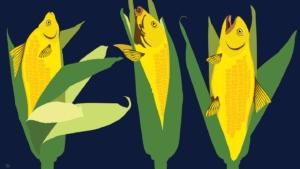A Johns Hopkins professor is determined to make sure the same pitfalls of agriculture aren’t repeated in aquaculture. Jillian Fry, director of the Johns Hopkins Center for Livable Future‘s Seafood, Public Health, and Food Systems Project, is an expert in all things aquaculture.

Image created by Paul Garland for Johns Hopkins Magazine
This year, the world’s first deep-sea aquaculture project will harvest their first generation of salmon in a structure called Ocean Farm 1, owned by SalMar. While this project is off the coast of Norway, similar efforts could soon start of US coastlines, as a bill was recently introduced into the Senate streamlining the permit approval process for deep-sea farming in federal waters. Fry flew to DC to voice her concerns and urge the Senate to consider strong oversight, reporting requirements, and transparency to avoid the pollution often associated with land-based farming.
Farmed fish could provide a sustainable source of seafood if done right, but many operations cause environmental damage and issues with human health. A common malpractice is the overuse of chemicals and antibiotics on the fish, leading to antibiotic resistance or drug residues. Tightly-packed fish can also cause diseases to spread rapidly, which can become a problem for wild fish. The netting can also accidentally capture wild species or tear, releasing farmed fish into the ocean. Although indoor pens prevent these problems, they require large amounts of energy to operate.
Fry is also interested in the nutrition of farmed fish compared to wild-caught fish. In some of her most recent research, published in Environmental Research Letters, Fry found that, compared to land based livestock, fish and crustaceans can more efficiently convert food into body weight, but don’t really offer more protein. Salmon, on the other hand, is an efficient protein producer, on par with chicken. Fry hopes that more research will be done on the safety of aquaculture facilities and there will be more coordination between state and federal agencies.
Adapted from an article in Johns Hopkins Magazine
